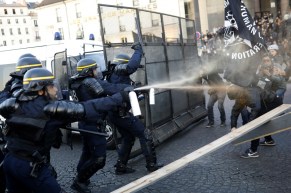


Far-right leader Marine Le Pen and centrist Emmanuel Macron are set to face each other in a May 7 runoff for the French presidency after leading the first round of voting.
With 91 per cent of the votes counted Monday morning, Mr Macron led with 23.5 per cent, ahead of Ms Marine Le Pen on 22.08 per cent. Centre-right candidate François Fillon had 19.74 per cent and the far-left’s Jean-Luc Mélenchon was on 19.47 per cent.
It is the first time since the French presidential system was introduced in 1958 that neither major party of the centre-right or the socialist left will contest the second round of the election.
With just over 6 per cent of the vote, Benoît Hamon’s score for the mainstream socialists was the worst achieved by a centre-left candidate since 1969.
An estimated 70 per cent of the country’s registered voters took part in the election, a similar figure to the 2012 poll.
Both Mr Hamon and Mr Fillon have declared their support for Mr Macron in the second round election.
Violent response
News of the initial results were met by ugly scenes as supporters from both camps engaged in violent clashes in throughout France.
At least one woman was injured three people detained in the Bastille area of Paris, and firefighters were called to the scene as police tried to control large crowds who burned cars, danced around bonfires and dodged riot police.
Later, around 300 people gathered at a peaceful protest at nearby Place de la Republique, waving red flags and dancing around the flames of a bonfire.
Some sang “Now burn your electoral cards” or “No Marine and No Macron!”
Protesters in the western city of Nantes lit flares and carried banners condemning both run-off candidates declaring: “Not a banker, nor a racist”.

Speaking to supporters after the polls closed, Ms Le Pen said: “It is time to free French people from arrogant elites … I am the people’s candidate”.
“The French people must seize this opportunity, because the enormous challenge of this election is the wild globalisation that puts our civilization at risk,” she said.
“Either we continue to disintegrate without any borders, without any controls, unfair international competition, mass immigration and the free circulation of terrorists, or you choose France with borders.”
The result, if confirmed, will mean a face-off between politicians with radically contrasting visions for a country whose economy lags that of its neighbours and where a quarter of young people are unemployed.
Alhough Mr Macron, 39, is a comparative political novice who has never held elected office, opinion polls in the run-up to the ballot have consistently seen him easily winning the final clash against the 48-year-old Ms Le Pen.
Mr Macron told his supporters he wants to be a “president for patriots faced with the threat of nationalism”.
If elected president, not only would Mr Macron become France’s youngest ever president, it would dramatically reduce the prospect of an anti-establishment shock on the scale of Britain’s vote last June to exit the EU and the election of Donald Trump as US president.
Mr Macron has said he favours gradual deregulation measures that will be welcomed by global financial markets, while Mr Le Pen wants to drop the Euro currency and possibly pull out of the EU.
Ms Le Pen has also been a strong advocate of tight migration controls, curbs on Islamic activity in France and increased national security.
While Mr Macron has never held public office, he served as economy minister under current President Francois Hollande.
He will enter the second-round of the election as favourite after winning the support of several of the defeated first-round candidates.
Mr Macron told the AFP news agency “a new page in French politics is being turned” as the results emerged.
Whatever the outcome on May 7, it will mean a redrawing of France’s political landscape, which has been dominated for 60 years by mainstream groupings from the centre-left and centre-right, both of whose candidates faded.
– With news agencies











